It sounds simple: Want to maximize vacation rental occupancy and revenue? Turn on “instant booking”. You boost occupancy, no inventory goes to waste, and you don’t have to spend time accepting bookings manually. Win, win, win—right?
Well, not necessarily. Instant booking brings more risk.
You might not have time to vet guests before they check in, risking damage or other issues like parties. You might get a last-minute reservation that sends your cleaning staff into a panic. You might need to send check-in instructions to a new guest quickly when you hadn’t planned to be online. It can feel like a major headache.
Rest assured, though—accepting instant bookings and last-minute reservations IS possible, without last-minute stress or risking your property’s safety. You just need to implement the right automation solutions.
That’s why in this post, we cover:
- What instant booking is and how it works on Airbnb, Booking.com, Tripadvisor, and Vrbo
- The advantages of turning on instant booking for your vacation rental business
- The drawbacks and risks of instant booking to be aware of
- Tips on how to manage instant bookings successfully for your vacation rentals
We also offer recommendations on how to get the most out of instant booking by listing on niche sites that focus on bringing in last-minute guests to fill the gaps in your calendar.
What is instant booking and how does it work?
The term “instant booking” means that anyone browsing online can instantly book and confirm a property reservation online without speaking to or messaging the host or management company first.
Sometimes the guest doesn’t even have to sign in, have a profile, or provide payment details (for example, if an option like “pay on arrival” is available.) They can just reserve instantly.
Here’s how it works across the main online travel agencies (OTAs).
Instant booking with Airbnb
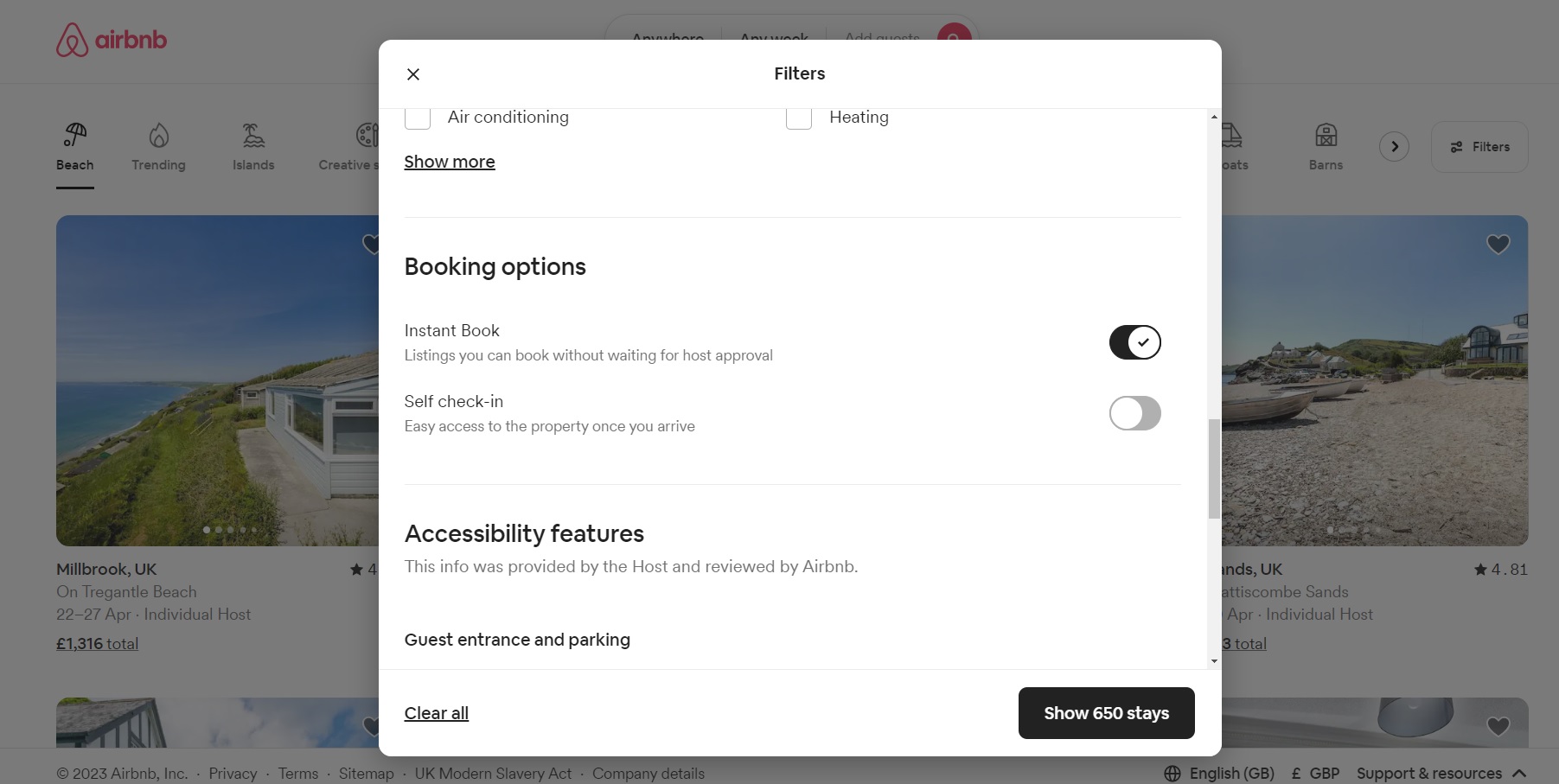
Source: Airbnb.com
Airbnb’s system is a good example of the differences between instant booking and non-instant booking in general.
Let’s see how it works.
- Guests can book Instant Book properties instantly, without checking or chatting with the host first.
- They search their travel dates, select dates that are available on the property’s calendar, enter their details and payment information, and that’s it.
- Their stay is booked and confirmed. In confirming, they automatically agree to the house rules.
This is in contrast to a property without the Instant Book option. These listings require guests to:
- Search their dates and select their info (like the number of guests.)
- Hit the “Request to Book” button.
- Send a message to the host asking to book.
The host then has a limited time to respond to the booking request before it expires. They can:
- Check out a guest’s profile and past reviews, check their background, and ask questions.
- Choose whether to accept or deny the booking. If they accept, the booking is confirmed.
If the host doesn’t respond within a certain time, the request expires, and/or the guest finds somewhere else to stay. Not replying can have consequences on a host’s standing (for example, on Airbnb, it can impact their Superhost status.)
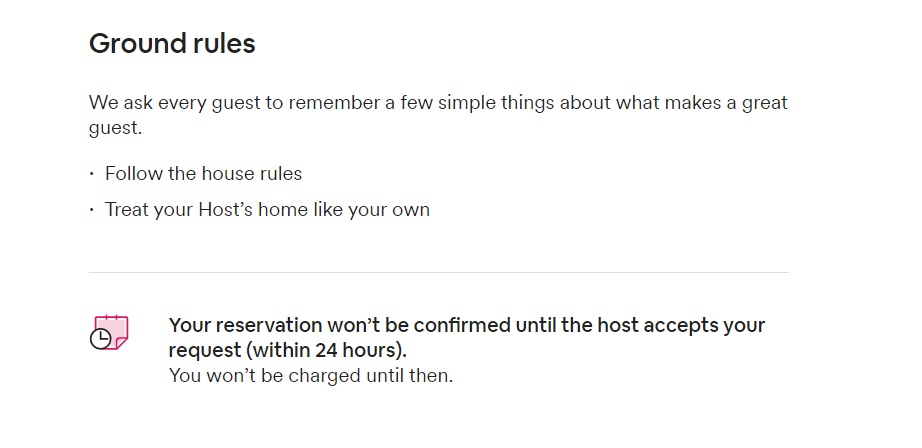
Source: Airbnb.com
Airbnb isn’t the only listing site that offers instant booking.
| Offers instant booking? | Platform’s name for it? | Can be toggled on and off? | Can hosts cancel an instant booking without penalties (if there are no extenuating circumstances)? | |
 |
Yes. | “Instant Book.” | Yes. | Hosts can cancel only if:
If the guest has agreed to the house rules and hasn’t broken any policies, then canceling incurs penalties for the host. |
 |
Yes. | It’s standard. “Reserve.” | No. | Same as for Airbnb. |
 |
Yes. | “Instant Booking.” | Yes. Only eligible properties or businesses can use it, on application. | Same as for Airbnb. |
 |
Yes. | “Instant Booking.” | Yes. | Same as for Airbnb. |
Advantages of turning on instant booking
Turning on instant booking can bring several major advantages for hosts and property managers.
Higher booking rates and more revenue
Turning on instant booking makes it much easier for the guest to book since there’s less friction and uncertainty, which has a direct impact on business performance.
More last-minute bookings and maximum use of inventory
Because instant booking is fast and efficient, making it available tends to attract more last-minute bookings. So, you book more guests and get rid of awkward empty calendar gaps.
Less manual work or time spent on messaging
Instant booking is a form of digital automation that can make your life easier. As the host or manager, you don’t have to be on constant alert so you don’t miss any new message or booking inquiry that comes in. Turning on instant bookings saves time, stress, and pressure, and leaves you free to manage other aspects of your business (or to simply step away from the screen for longer).
Better ranking on OTAs
Turning on instant booking means more people see and book your listings because Airbnb and other OTAs prioritize them in their search results, as they make for a simpler booking experience. This means more views and interactions with your pages, which pushes them higher up the rankings, too. It’s a positive cycle and will keep your listings visible and thriving.
Drawbacks and risks of instant bookings
Consider these instant-booking cons before deciding whether to toggle the setting on or off.
It’s easier to miss important communications
When you have bookings coming in automatically, you may be more likely to miss any messages or requests that do come in. This makes it less likely you’ll have time to share all the normal guest arrival information, like directions, check-in access code, or other important details.
You risk a double booking
Taking instant bookings means you have no time to double-check dates or compare the latest availability between platforms (for example, if you list the same property on both Airbnb and Vrbo). This means you risk double bookings as you take reservations before you’ve updated your calendars.
There’s a greater risk of damage, or your property being used for a party
No prior vetting means there’s more risk of bad guests (like guests who may break the house rules or have a party despite it being banned.) Guests who intend to have as little communication with the host as possible, and who are planning a party, are more likely to filter their search by instant booking.
Operations can quickly become complicated
Coordinating cleaning or maintenance teams just days or hours before the new guests arrive can be stressful, especially if you manage task assignments manually. Sending messages, checking everyone has the information they need, making sure everything is ready… it can become stressful, fast.
But, as you’ll see below, you can address all these issues with the right tactics and technology.
Tips for managing instant bookings
Using a platform like Hostfully makes managing instant bookings easier and saves you from sprinting to keep up with your ever-changing schedule.
We recommend that you:
Automate messaging
Automated messaging sends important details to guests at crucial moments during their guest journey. So even if a booking comes in without you realizing immediately, you can still create a great first impression and make sure guests have everything they need, including essential check-in details.
Automate task scheduling
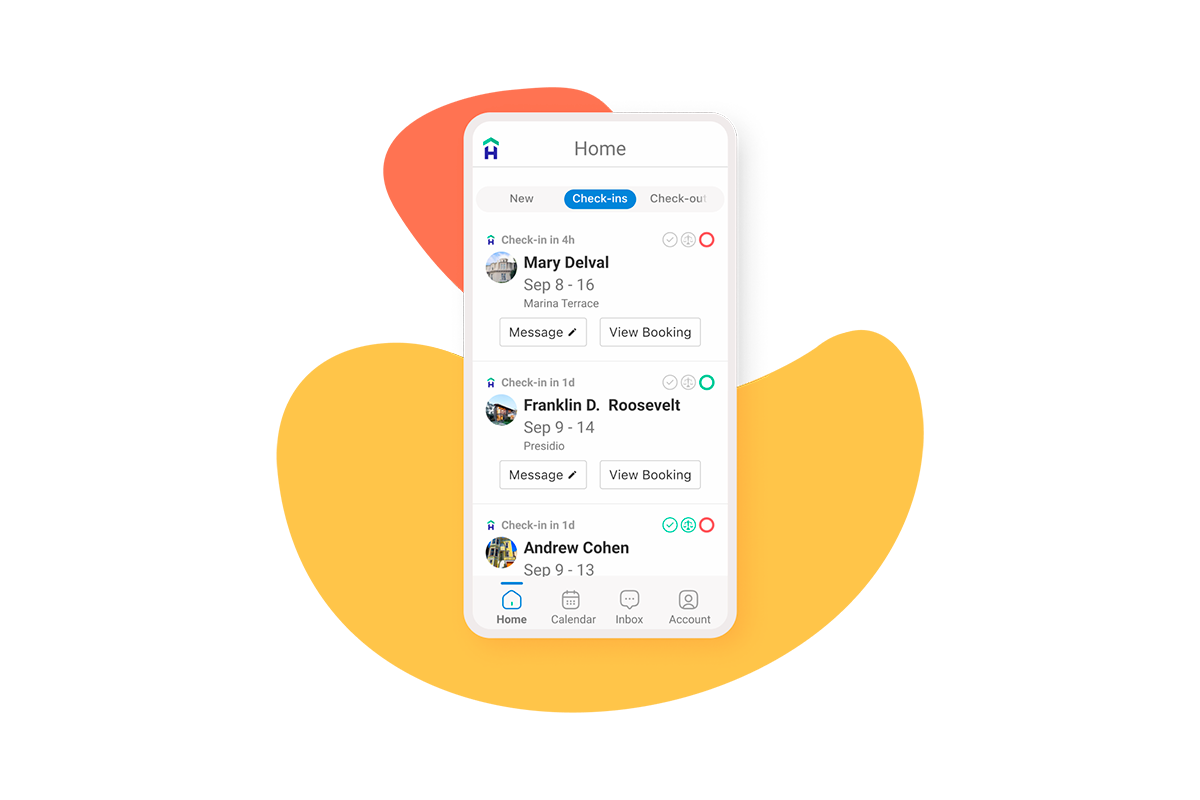
Source: Hostfully.com
Last-minute booking for an unprepared property? No problem. Automated task scheduling lets you automatically assign cleaners to turn around a unit whenever the last guest checks out, or schedule a clean as soon as a new booking comes in. Your team is notified instantly and can get to work as per your customized rules.
Share digital guides
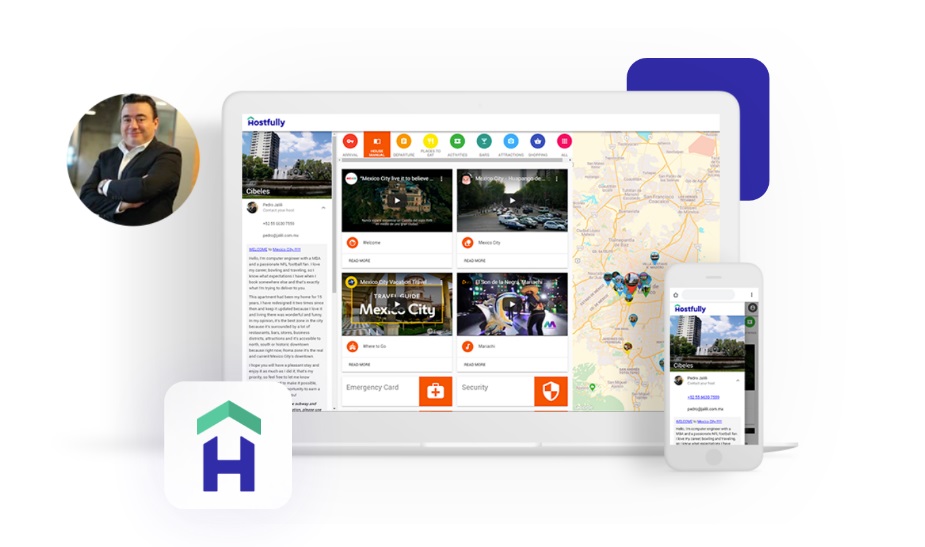
Source: Hostfully.com
A great complement to automated messaging, digital guides ensure your guests have everything they need to know about the property and the local area. The best part is that you don’t have to worry about sending it all to them manually. Just include a link in your automated messaging to your guidebooks. With a tool like Hostfully, which seamlessly integrates with Hostfully Guidebooks, you give guests autonomy, which improves their stay and saves you time.
Sync availability
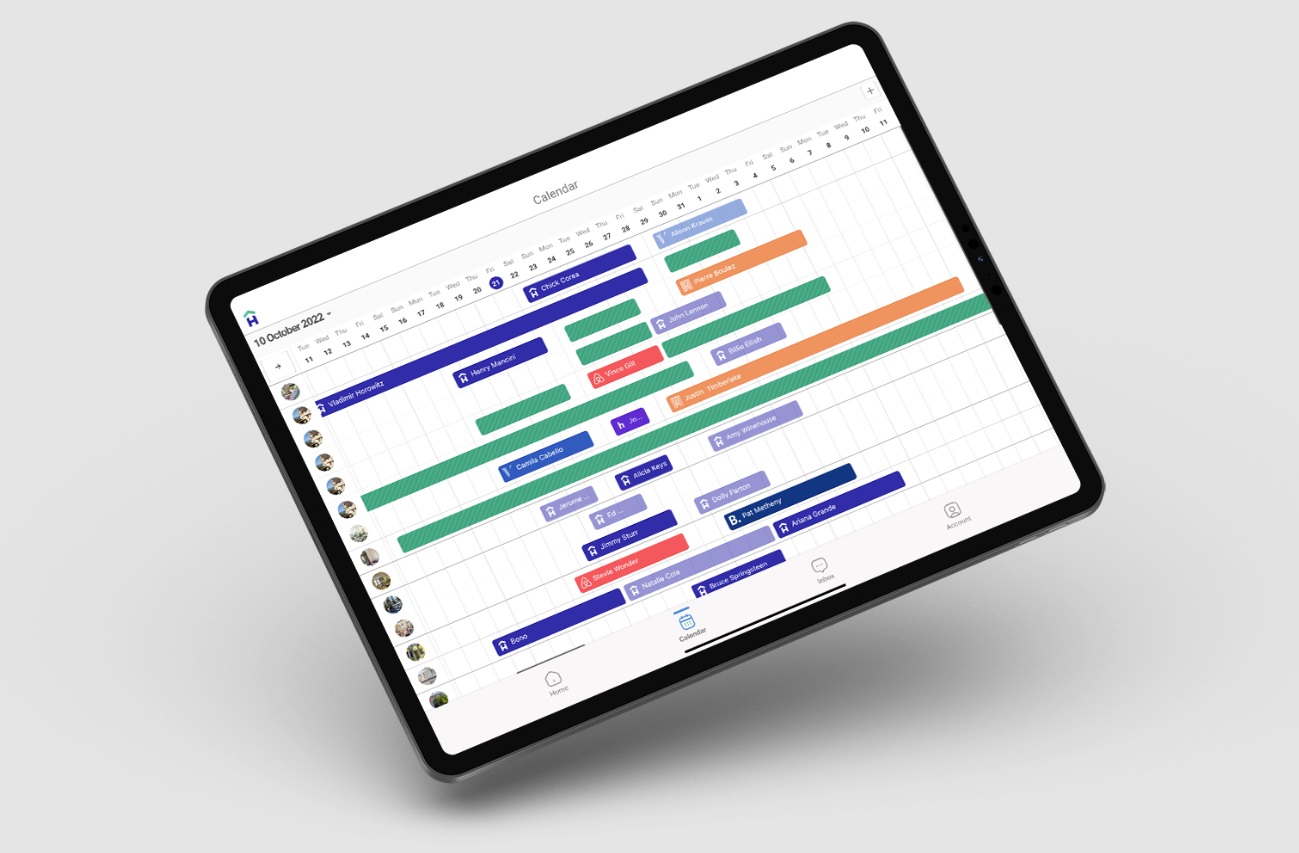
Source: Hostfully.com
Clashing bookings are every host or manager’s nightmare and are a surefire way to give guests a terrible first impression of your operation. But updating calendars across OTAs can be time-consuming and error-prone. That’s why Hostfully offers a centralized messaging app, distribution channel manager, and centralized calendar, with automated syncing across channels, so you can avoid double bookings.
Set additional guest criteria
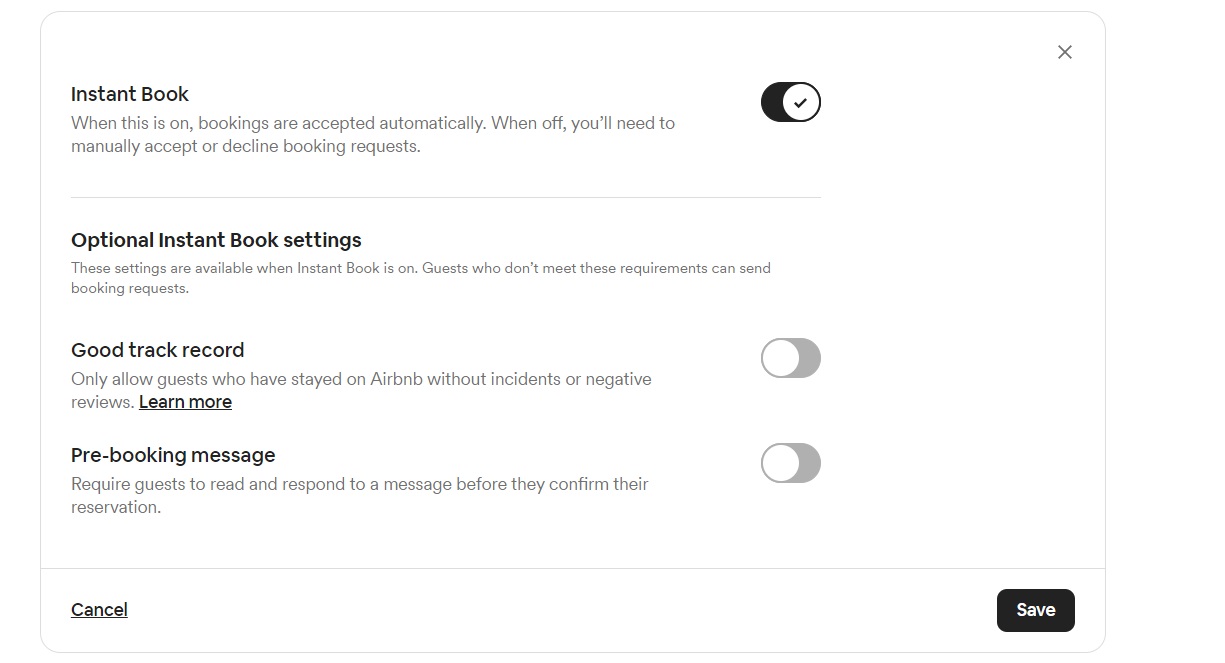
Source: Airbnb.com
Although OTAs like Airbnb encourage hosts to find ways to attract last-minute bookings and instant reservations, some also let you put additional criteria and guest requirements. Including these on your listings can offer an extra layer of protection for your instant bookings, so even if you can’t fully vet guests before they book, you can still implement some basic rules and policies.
For example, on Airbnb, you can state that booking automatically means the guest is agreeing to the house rules, while requiring a verified ID also adds a degree of protection.
Screen guests automatically
It may seem as though there’s no way to vet guests before they confirm on instant bookings, but using automation technology can help here, too. For example, Hostfully integrates with background-checking tools like Autohost, Safely, and SUPERHOG, so you can automatically run background searches for fraud, criminal records, or a history of poor host reviews.
Monitor in-property noise
You may not always be able to predict which guests will cause trouble, or those who’ll have parties without permission, but with noise monitoring tools like Minut and NoiseAware, you get alerted if noise levels exceed a customized threshold for a certain amount of time.
List on niche OTAs that target last-minute bookings

Source: Getawaygogo.com
Some OTAs specialize in last-minute bookings, and help you fill what would otherwise be empty gaps in your calendar. Listing on these sites can help you maximize the opportunities afforded by last-minute, instant bookings, without extra work.
These include:
- Getaway Go-Go – Online marketplace that integrates with Hostfully for last-minute vacation rental deals
- Whimstay – Online rental site, which also integrates with Hostfully, designed to help guests save up to 60% on last-minute bookings
Vacation rental instant bookings: More pros than cons
Vacation rental hosts or managers rightly approach instant bookings with caution. Despite being easier for guests and offering you a chance to boost revenue and occupancy, they can add complexity and open you up to more risk.
But you can address those downsides by partnering with a property management platform with expertise in automation, like Hostfully. With the right solutions in place, you can:
- Avoid double bookings
- Be alerted to high-risk bookings
- Provide even last-minute guests with all the information they need
- Easily manage your cleaners
- Save hours of work each week
Maximize your revenue and occupancy, boost your stays year-round, and harness the power of Hostfully automation to handle last-minute, instant bookings with ease, no matter how long your guests book in advance.
Frequently asked questions about instant booking pros and cons
What is instant booking?
Instant booking typically means that anyone browsing online can book and confirm a vacation rental property reservation online, without checking with anyone or requesting to book first. Some sites don’t even need payment details or an ID. This is in contrast to tools like “Request to Book” on Airbnb, which require guests to send a message to the host to ask if they can book.
What is the difference between Request to Book and Instant Book on Airbnb?
The main difference between Instant Book and Request to Book on Airbnb is that with the latter, the host has to confirm a guest’s booking request before it’s confirmed.
With Instant Book, guests can find dates that are available on the unit’s calendar, put in their details and payment information, and confirm their booking instantly. With Request to Book, would-be guests need to send hosts a message asking first, and their booking isn’t confirmed until the host accepts it.
Is instant booking on Airbnb worth it?
Using the Instant Book feature on Airbnb (other online travel agency sites) can definitely be worth it, as it boosts revenue and occupancy, and offers guests a smoother booking experience. Other benefits include making it easier for guests to book and enabling last-minute reservations.
Yet, instant booking does carry some risks, like accidental double bookings, and a greater risk of damage by bad guests. Using an automation platform like Hostully addresses these risks, making instant bookings better for guests and safer for hosts.
Can I cancel Airbnb Instant Book penalty-free?
Platforms like Airbnb and Vrbo each have their own cancellation policies surrounding hosts being allowed to cancel stays, and mainly restrict host cancellations for when guests have explicitly broken the guidelines or policies. Canceling an instant booking for any other reason is usually not allowed without penalties like a lower search ranking or losing your Superhost status.



